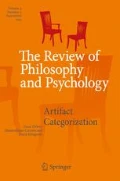Abstract
Obscurity of expression is considered a flaw. Not so, however, in the speech or writing of intellectual gurus. All too often, what readers do is judge profound what they have failed to grasp. Here I try to explain this “guru effect” by looking at the psychology of trust and interpretation, at the role of authority and argumentation, and at the effects of these dispositions and processes when they operate at a population level where, I argue, a runaway phenomenon of overappreciation may take place.
Similar content being viewed by others
Notes
I am using here the English word “guru,” not the Sanskrit word from which it is derived.
For the distinction between intuitive and reflective beliefs, see Sperber 1997.
This is a central claim of Relevance Theory (Sperber and Wilson 1995)
See Sperber 2001
For doubts that it is so, see Dennett 1989.
See Sperber 1996
References
Dennett, Daniel (1989). Murmurs in the cathedral (review of R. Penrose, The Emperor’s New Mind). The times literary supplement, September 29–October 5, pp. 55–57.
Mercier, H., and Sperber, D. 2009. Intuitive and reflective inferences. In Evans, J. St. B. T. and Frankish, K. (Ed.) In two minds: Dual processes and beyond. Oxford University Press.
Penrose, R. 1989. The emperor’s new mind: Concerning computers, minds, and the laws of physics. Oxford: Oxford University Press.
Sperber, D. 1996. Explaining culture: A naturalistic approach. Oxford: Blackwell.
Sperber, D. 1997. Intuitive and reflective beliefs. In Mind and Language 12(1): 67–83.
Sperber, D. 2001. An evolutionary perspective on testimony and argumentation. Philosophical Topics 29: 401–413.
Sperber, D., and D. Wilson. 1995. Relevance: Communication and cognition, 2nd ed. Oxford: Blackwell.
Wason, P.C. 1960. On the failure to eliminate hypotheses in a conceptual task. Quarterly Journal of Experimental Psychology 12: 129–140.
Author information
Authors and Affiliations
Corresponding author
Rights and permissions
About this article
Cite this article
Sperber, D. The Guru Effect. Rev.Phil.Psych. 1, 583–592 (2010). https://doi.org/10.1007/s13164-010-0025-0
Published:
Issue Date:
DOI: https://doi.org/10.1007/s13164-010-0025-0




